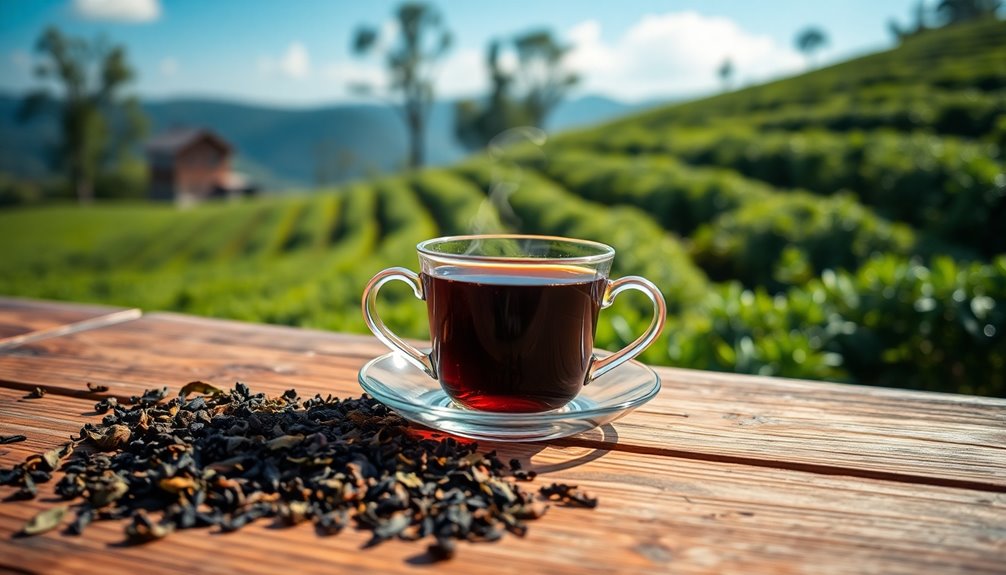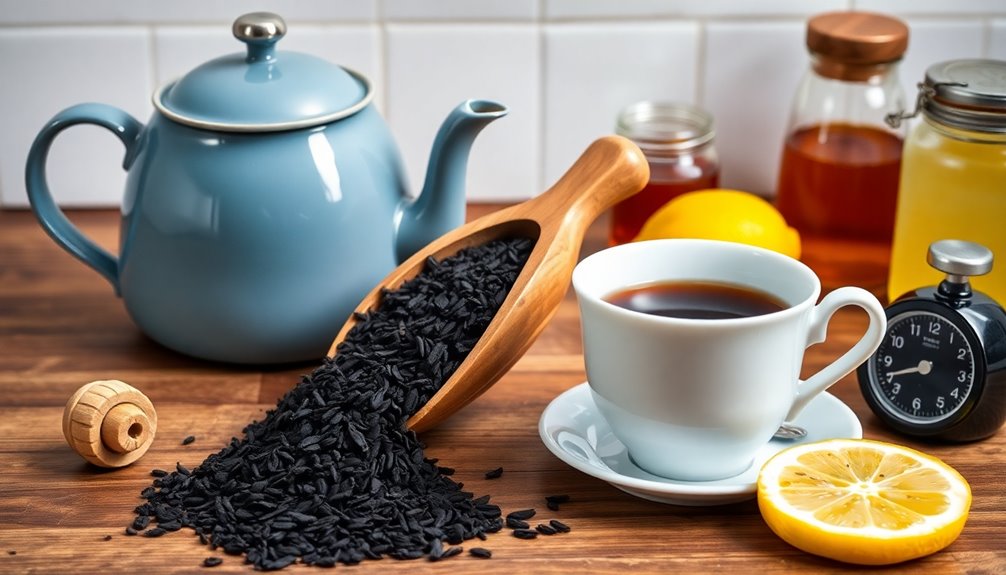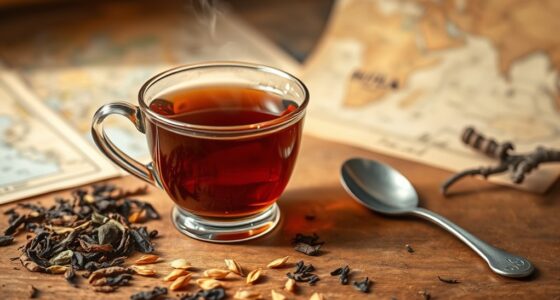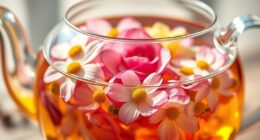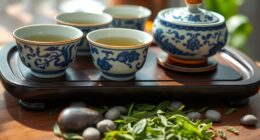Black tea is the most popular tea in the world because it makes up over 70% of global tea consumption. Its bold flavor and rich aroma appeal to many people across different cultures. Black tea has a fascinating history, first introduced to Europe in the 16th century and gaining popularity through trade routes. You can enjoy it in many ways, like the afternoon tea tradition in England or the spiced chai in India. With so many ways to drink it and over 6 billion kilograms consumed yearly, it's easy to see why black tea rules the tea world! There's even more to discover!
Key Takeaways
- Black tea accounts for over 70% of global tea consumption, making it the most widely enjoyed tea variety.
- Its bold flavor and rich aroma appeal to diverse palates across cultures.
- Historical trade routes facilitated its introduction and popularity in Europe and beyond.
- Cultural rituals, like afternoon tea and chai, enhance social bonding and enjoyment of black tea.
- Major producers like China, India, and Sri Lanka ensure a steady supply and variety.
Introduction
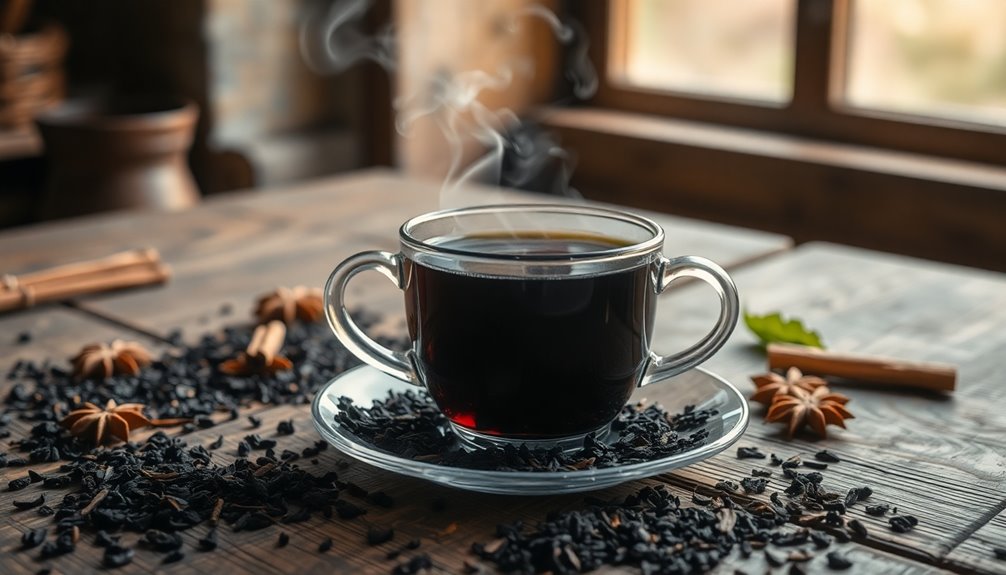
When you think about tea, black tea likely comes to mind as the most consumed variety worldwide. It accounts for over 70% of global tea consumption, making it a popular tea choice for many. With its bold flavor and rich aroma, it's no wonder that black tea appeals to tea drinkers everywhere. You might enjoy a cup in the morning for that caffeine kick or during social gatherings for a comforting experience.
The historical origins of black tea trace back to China's Ming dynasty. It gained popularity in the West during the 16th century, and since then, it's become a staple in various cultures. Major producers like China, India, and Sri Lanka cultivate different varieties, such as Assam, Darjeeling, and Ceylon. Each type brings its own unique taste and character. The global tea market is valued at approximately $200 billion, highlighting the economic significance of black tea. Loose leaf tea often provides superior flavor compared to bagged tea, enhancing the tea experience.
Cultural practices surrounding black tea, like afternoon tea in England and chai in India, highlight its significance in everyday life. These rituals not only enhance the enjoyment of black tea but also bring people together.
Historical Trade Routes Impact
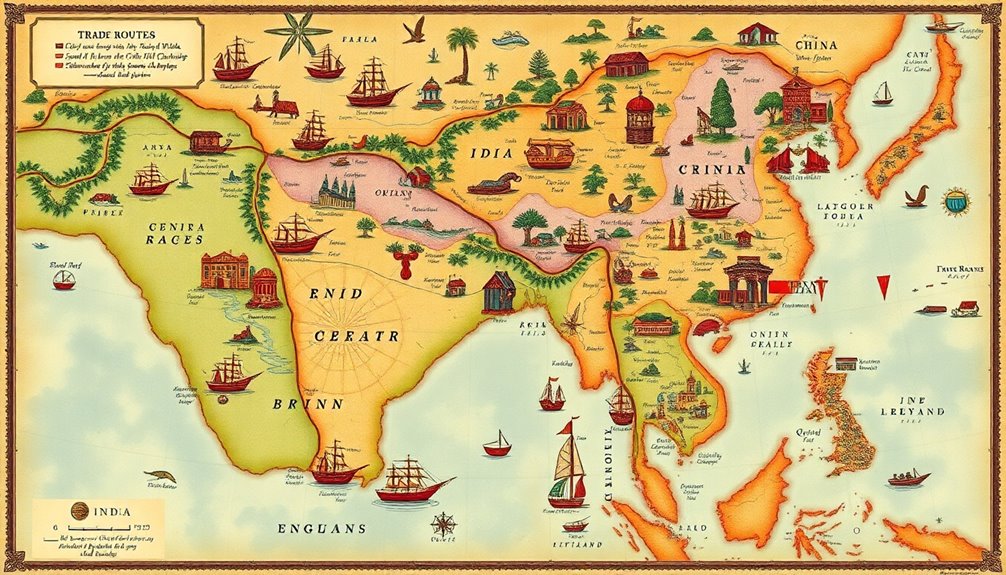
The journey of black tea from its origins in China to global prominence was significantly shaped by historical trade routes. These routes, established during the Tang Dynasty, helped spread black tea, made from the leaves of Camellia sinensis, to different regions.
In the 16th century, Portuguese traders introduced black tea to Europe, marking the start of tea's integration into Western culture.
As the demand for tea grew, the British East India Company played a crucial role in expanding black tea trade during the 17th century. This led to a rise in its popularity in Britain and beyond.
To keep up with this growing interest, tea plantations were established in India and Sri Lanka in the 19th century. These plantations ensured a steady supply of black tea, which further solidified its global popularity.
The rich history of black tea, intertwined with trade routes and colonial expansion, laid the foundation for its status as the most consumed tea worldwide.
In fact, over 70% of all tea consumed today is black tea! Understanding this journey helps you appreciate the tea culture that surrounds us and the flavors you enjoy.
Global Consumption Statistics
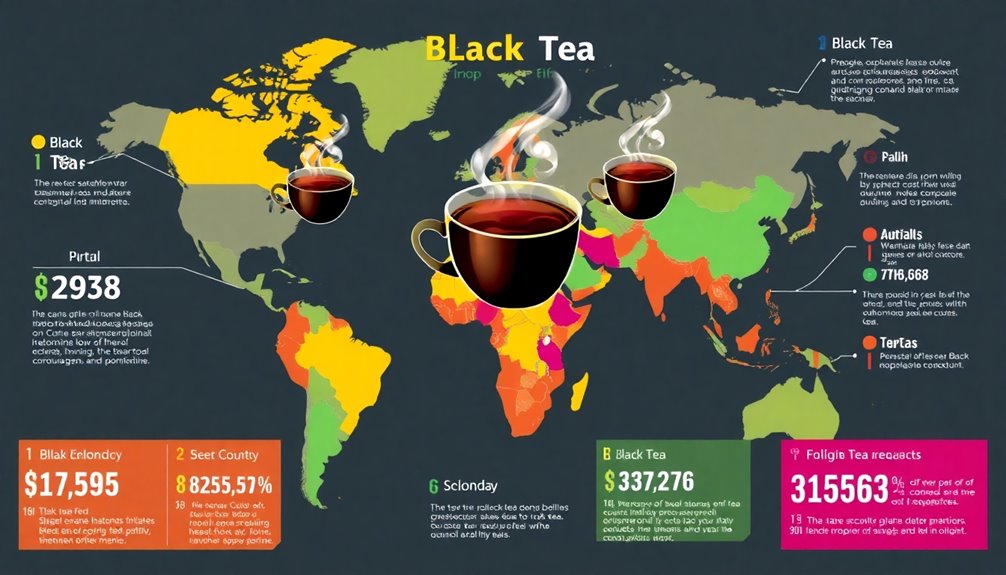
Black tea's dominance in global consumption is a testament to its enduring appeal and cultural significance. Did you know that black tea accounts for about 75% to 78% of total global tea consumption? This makes it the most consumed tea worldwide!
In Turkey, people drink the most black tea, with an impressive annual consumption of 3.16 kg per person. Ireland and the United Kingdom also enjoy their fair share, consuming 2.19 kg and 1.94 kg respectively.
The global tea market, valued at around $200 billion as of 2021, shows just how popular black tea really is. In fact, over 90% of tea sold in Western countries is black tea!
When you consider that annual global tea consumption exceeds 6 billion kilograms, you can see black tea plays a significant role in this number.
Cultural Rituals Surrounding Tea
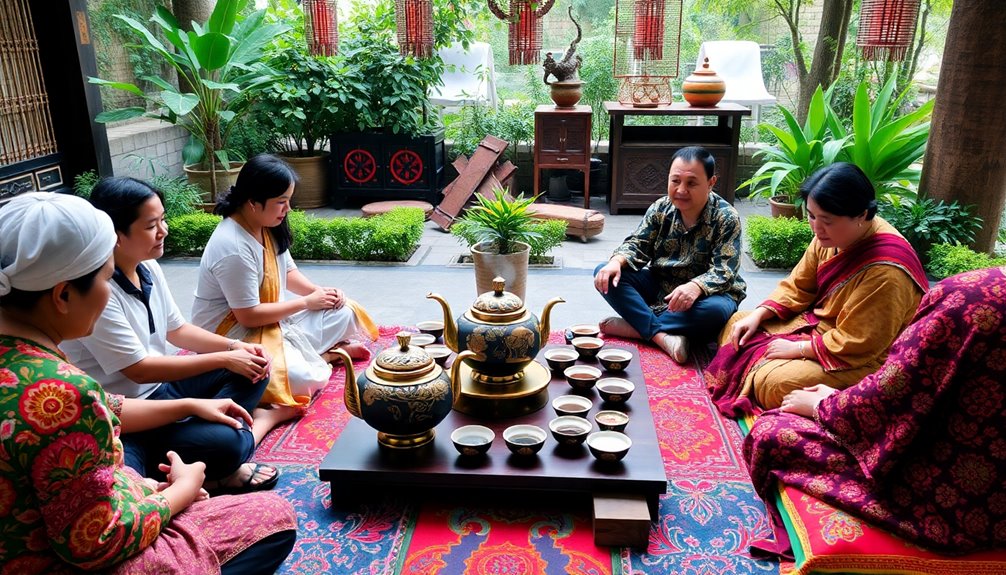
Tea's significance extends beyond mere consumption; it plays a central role in various cultural rituals around the world.
When you think of black tea, consider how it connects people. In England, the tradition of afternoon tea invites you to enjoy black tea with light snacks, creating a moment for friends and family to bond.
In India, the popular chai blends black tea with milk and spices, showcasing regional flavors that warm your heart.
Turkey leads the world in per capita black tea consumption, where it's more than a drink; it symbolizes hospitality during gatherings. You'll find that serving tea is a sign of friendship and community.
In Russia, black tea traditionally comes with sugar and lemon, highlighting its role in social customs since the 17th century.
Even in Japan, where tea ceremonies are famous, black tea sometimes finds its place, reminding you of mindfulness and appreciation in preparation.
Additionally, the act of sharing black tea often promotes effective relaxation techniques, helping to foster connections and reduce stress in social settings.
Each sip of black tea invites you to experience these rich cultural rituals, connecting you to the history and warmth of each tradition.
Health Risks of Overconsumption

Consuming too much black tea can lead to several health risks you mightn't be aware of. Drinking more than 5-6 cups a day can increase your caffeine intake, which may cause insomnia, anxiety, and a racing heart.
You mightn't realize that excessive consumption of black tea can also interfere with iron absorption. This is due to its tannin content, and it can raise your risk of iron deficiency anemia, especially if you have specific dietary restrictions.
Additionally, some black tea varieties contain high levels of fluoride. If you drink too much over time, it could contribute to dental and skeletal fluorosis.
You should also be cautious about becoming dependent on caffeine. If you suddenly cut back, you might experience withdrawal symptoms like headaches and fatigue.
Lastly, some studies hint that excessive black tea consumption might be linked to an increased risk of certain cancers, especially in people with pre-existing health conditions. Moreover, the potential side effects of black tea may be exacerbated by other substances consumed alongside it, such as medications.
While more research is needed, it's good to be aware of these potential health risks and enjoy black tea in moderation for your well-being.
Practical Applications
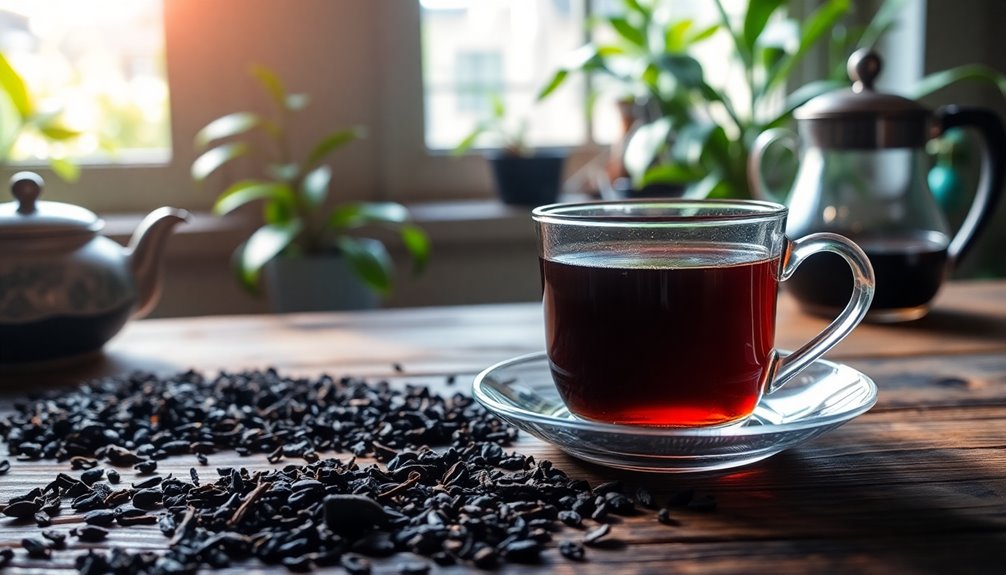
Moderation is key when enjoying black tea, but its popularity offers numerous practical applications that enhance daily life. With black tea accounting for around 75% to 78% of global tea consumption, it's clear that many people enjoy its bold flavor and high caffeine content. You can easily incorporate popular varieties like Earl Grey or Masala Chai into your daily routine to suit your taste.
Start your morning with a refreshing cup to kickstart your energy levels, while also benefiting from its high antioxidant levels. These properties can support heart health, making black tea a smart choice for health-conscious drinkers. Additionally, studies have shown that high antioxidant levels can combat oxidative stress, further enhancing the beverage's health benefits.
Additionally, the rich history of black tea connects you to cultures around the world. When you pour a cup, you're participating in a tradition that dates back to the Ming dynasty.
Whether you're sipping it at breakfast or enjoying a warm cup in the afternoon, black tea's diverse blends cater to different preferences and occasions. This cultural significance and versatility make black tea more than just a beverage – it's a daily ritual that can enhance your life!
Frequently Asked Questions
Why Is Black Tea the Most Popular?
You might find black tea's bold flavor and rich aroma irresistible. Its higher caffeine content keeps you energized, while its historical roots and diverse varieties offer a unique experience that captivates tea lovers everywhere.
Which Is the No. 1 Tea in the World?
You'll find that black tea holds the title as the number one tea in the world. Its bold flavor, rich aroma, and higher caffeine content make it a favorite choice for many tea drinkers.
What Makes Black Tea Unique?
Black tea's unique richness comes from its bold flavor and higher caffeine content. The oxidation process gives it a dark hue and distinct taste, making it versatile and appealing to various palates around the globe.
Which Country Drinks the Most Black Tea?
If you're curious about black tea consumption, Turkey leads the world, with each person averaging 3.16 kg annually. Ireland and the UK follow, showcasing their strong tea cultures and love for this beloved beverage.
Conclusion
In conclusion, black tea's popularity around the world comes from its rich history, health benefits, and cultural significance. Whether you enjoy it alone or share it with friends, there's a special charm in every cup. Remember to drink it in moderation to avoid any health risks. So, next time you sip your favorite black tea, appreciate the journey it took to reach you, and enjoy the warmth it brings to your day!

